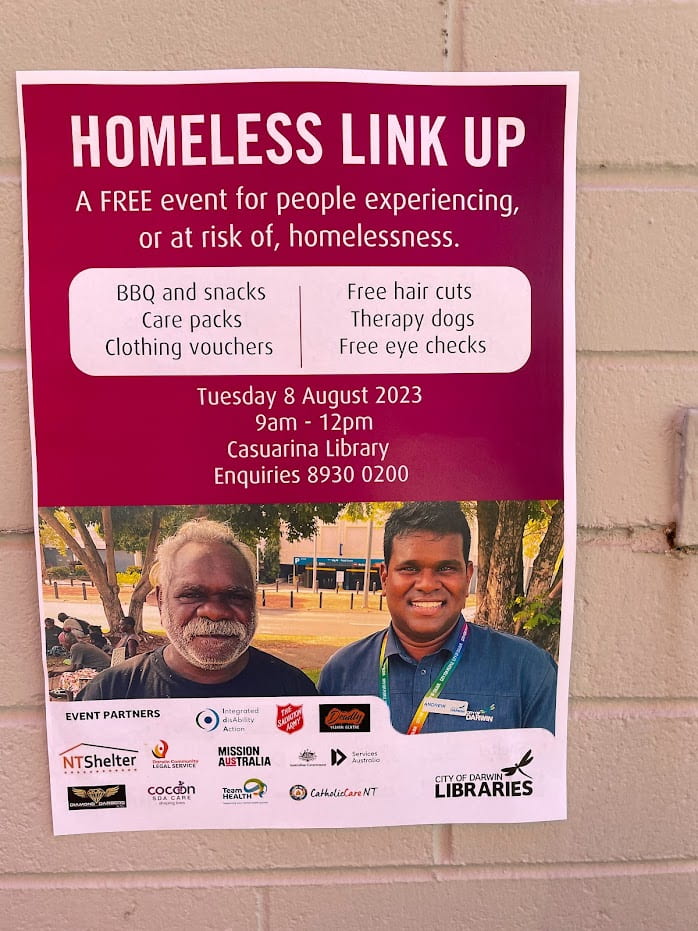
The first of my six case studies is underway this week with a trip to Bathurst, NSW. Bathurst is one of my two regional case studies – the other will be Darwin, later in the year. I am being assisted greatly by my colleague Professor Sharynne McLeod whose blog you can read here: https://speakingmylanguages.blogspot.com/ I am also receiving a great deal of help from the Bathurst Uniting Social Services (BUSS) who run multiple services for people experiencing many forms of disadvantage. While I am here, I am speaking with people who are experiencing homelessness or insecure housing about their experiences and attitudes towards using their public library. I am also speaking with the fabulous people who are running BUSS, and library workers, and I am running a short survey of library users about how they feel about sharing library spaces with people they think may be experiencing homelessness.
I started work yesterday by testing my survey with a small group of users. I asked the five ladies who came to knit together in the library to do my survey. They were lovely and all said they would, although one started it and gave up quickly because she had spent the two days before cooking and then selling 500 scones! But the others worked through it and it operated well and the data was sending through to the collection point well. I was interested to hear them start to talk about homelessness together after they had each answered the survey. I didn’t hear what they were saying, but they were engaged in the topic.
This morning I started my first interviews with the clients of the Bathurst methodone clinic. This clinic runs from the Bathurst Base Hospital and is also attended by BUSS who cook breakfast for the people who are coming to dose. I interviewed five people and asked them questions about their past and current use of public libraries, their reasons for using or not using them, their experiences when they did use them and what they would like to see a public library provide for them. None of the men and women I spoke to are current users of the Bathurst library. There were many reasons for this, including “I can’t read so why would I go to a library?”, “A library isn’t a place for people like me”, “I can’t go to a library looking like I do, people would stare and make me really uncomfortable”, “The library is too far from my home and I can’t afford a car, so I can’t get there”, “I don’t need to know anything, so why would I go there”, and “I have spent most of my life in jail, so I don’t know how to be curious about anything anymore.”
When I asked them what they liked about using the BUSS services, they told me they like having a chance to socialise with people who understand them, don’t judge them, and are having the same sort of experiences. When I suggested they could all meet at the library to do that, when BUSS is closed, they said they wouldn’t be welcome because they would be too noisy and the library is a quiet place where you can’t talk. I wish they could have seen and heard the knitting ladies! This perception that the library is a quiet place of learning and reading is a real barrier for the people I spoke with, and I can see why they think that. I spent some time in the library this afternoon and it is very quiet. There were a few kids having a great time and they were making some noise, but there were no groups talking and everyone else was working as individuals studying or working on their computers. It does not feel like a place for groups or for conversations. Unless you are reading, or looking for something to read, or working/studying, there is little reason to visit. It does not feel like a social space – it feels like a place for individuals engaged in a small range of activities.
Tomorrow I will be conducting interviews with library staff and also some more BUSS clients who attend a lunch after drug and alcohol program.
One of the nice things that happened today when talking to one of the men at the methodone clinic was that he said “I had kind of forgotten about the library. I reckon I might head down there later and see if they will let me read a newspaper”. I didn’t see him there, but I hope he makes it!





